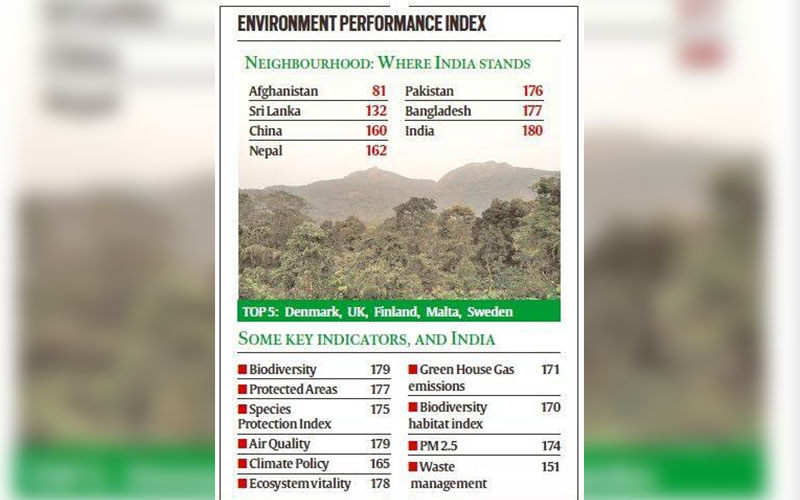The recently released Environment Performance Index-2022, an international ranking system that measures environmental health and sustainability of countries, has ranked India last among 180 countries that have been ranked.
With a paltry score of 18.9, India’s 180th ranking comes after Pakistan, Bangladesh, Vietnam and Myanmar — the bottom five together make up the poorest performing countries for environmental health.
India has also scored low on rule of law, control of corruption and government effectiveness, according to EPI.
The EPI, a biennial index, was started in 2002 as Environmental Sustainability Index by the World Economic Forum in collaboration with the Yale Center for Environmental Law and Policy and the Columbia University Center for International Earth Science Information Network.
“Using 40 performance indicators across 11 issue categories, EPI ranks 180 countries on climate change performance, environmental health, and ecosystem vitality. These indicators provide a gauge at a national scale of how close countries are to established environmental policy targets,’’says the EPI report.
Overall EPI rankings indicate which countries are best addressing environmental challenges , it states.
The report has found that “good policy results are associated with wealth (GDP per capita)’’, meaning economic prosperity makes it possible for nations to invest in policies and programmes that lead to desirable outcomes. “This trend is especially true for issue categories under the umbrella of environmental health, as building the necessary infrastructure to provide clean drinking water and sanitation, reduce ambient air pollution, control hazardous waste, and respond to public health crises yields large returns for human well-being,’’ the report states.

The pursuit of economic prosperity — manifested in industrialisation and urbanisation — often means more pollution and other strains on ecosystem vitality, especially in the developing world, where air and water emissions remain significant, it says. The report says that top-performing countries have paid attention to all areas of sustainability, while their lagging peers tend to have uneven performance.
“In general, high scorers exhibit long-standing policies and programs to protect public health, preserve natural resources, and decrease greenhouse gas emissions. The data further suggest that countries making concerted efforts to decarbonize their electricity sectors have made the greatest gains in combating climate change, with associated benefits for ecosystems and human health,’’ says the report.
The report states: “A number of important countries in the Global South, including India and Nigeria, come out near the bottom of the rankings. Their low EPI scores indicate the need for greater attention to the spectrum of sustainability requirements, with a high-priority focus on critical issues such as air and water quality, biodiversity, and climate change. Some of the other laggards, including Nepal and Afghanistan, face broader challenges such as civil unrest, and their low scores can almost all be attributed to weak governance.”